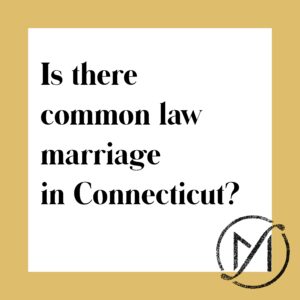Common law marriage shows up a lot on tv and in movies. In fact, it’s such a common myth that many people in very long term relationships assume they are legally married. But does common law marriage even exist in Connecticut? Can you wind up married just by virtue of your long term relationship? If you break up, do you need to get divorced even though you never took the step of legally marrying?
Read on to learn more.
What is a Common Law Marriage?
Common law marriage is a legal concept where romantic partners who live together for a certain period of time become legally married even though they never have a formal ceremony or get a marriage license. In states who recognize the concept, these couples have the same legal rights and responsibilities that they would have had they technically married. For example, common-law spouses might have rights to property division, alimony, and spousal support. They might even have to divorce in order to end their relationship legally.
Does Common Law Marriage Exist in Connecticut?
No matter how long people live together, there is no common law marriage in Connecticut. It is a common misconception that if unmarried couples reside together for a long enough period of time, they become married. They do not.
Are there any Exceptions to the Rule that Common Law Marriage is Not Recognized?
There’s only one, narrow exception to the rule. When determining whether a marriage is valid, Connecticut’s marriage laws look to the law of the state in which the relationship began. In other words, if romantic partners began and established a common law marriage in a state that recognizes it, that marriage will be recognized in Connecticut.
What if an Unmarried Couple Wants an Agreement on How Finances Will Work Should They Break-Up, But Doesn’t Want to Marry?
Many committed, long-term couples want to commit to a financial arrangement should they end their relationship. While there is no common law marriage in Connecticut, and living together (or “cohabitating”) does not trigger any financial rights or obligations, the partners may enter into a “cohabitation agreement.”
What is a Cohabitation Agreement?
A Cohabitation Agreement is a contract between unmarried cohabitants. The partners can agree to certain financial rights and obligations arising from their relationship.
Read: What is a Cohabitation Agreement? Read: Breaking Up is Hard to Do: Why Unmarried Couples Should Have Cohabitation Agreements
Next Steps
Issues facing unmarried couples are complicated. If you are in a long term relationship and do not plan to marry, you should consult with an experienced family law attorney.
Our first step at Freed Marcroft, the Goals & Planning Conference, is designed to get to the heart of your problem and unveil your true goals for your life. Once we discover your goals at the Goals and Planning Conference, our divorce lawyers are able to take our collective experience with family law, strategy, courts, judges, and other lawyers, and build an approach customized for you.









